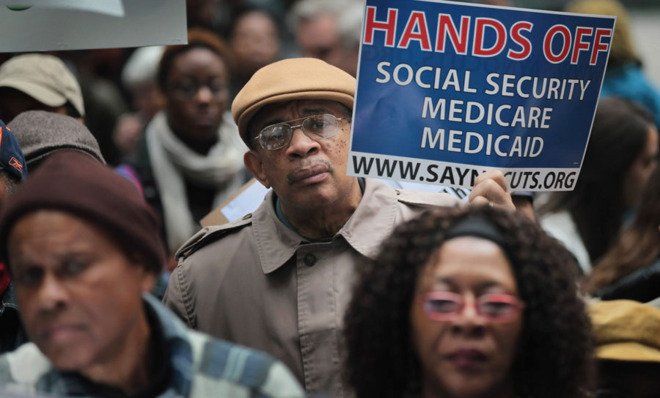The tough politics of Medicaid for Republicans
As the midterms approach, GOP governors are grappling with their shortsighted rejection of one of ObamaCare's central pillars


A free daily email with the biggest news stories of the day – and the best features from TheWeek.com
You are now subscribed
Your newsletter sign-up was successful
In the world of Republican politics, there is no surer bet than opposing ObamaCare. But conservative obstruction to the health care overhaul may finally be catching up with a handful of Republican governors running for re-election. Their rejection of ObamaCare's expansion of Medicaid — the federal health assistance program for the poor and disabled — has them losing both the argument and voters.
Princeton political scientist Sam Wang recently published an analysis of polling data from this year's gubernatorial races. It found that Republican incumbents who resisted ObamaCare's Medicaid expansion — including Wisconsin's Scott Walker, Pennsylvania's Tom Corbett, and Kansas' Sam Brownback — are in much tighter races than those who accepted it. "Republican governors who bucked their party's stance and accepted the policy are faring better with voters — in these races, an average of 8.5 percentage points better," Wang discovered.
This shouldn't be surprising. Setting aside the incendiary politics surrounding ObamaCare and its alleged freedom-killing agenda, the simple truth is that Republican governors have blocked health insurance for nearly six million citizens. And they've done so despite the fact that under ObamaCare, the federal government covers all the cost of expanding Medicaid for the next six years, and at least 90 percent of the cost in 2020 and beyond.
The Week
Escape your echo chamber. Get the facts behind the news, plus analysis from multiple perspectives.

Sign up for The Week's Free Newsletters
From our morning news briefing to a weekly Good News Newsletter, get the best of The Week delivered directly to your inbox.
From our morning news briefing to a weekly Good News Newsletter, get the best of The Week delivered directly to your inbox.
Why have Republican governors spurned this incredibly good deal? Their ostensible justification has been disbelief that the federal government would hold up its end of the bargain, leaving states to pick up the tab.
But researchers at the Urban Institute threw cold water on this argument in a study last month. They found that the federal government has almost never reduced funding to the states for Medicaid. In fact, it has not done so since 1981, when President Reagan and Congress imposed a temporary funding cut.
Indeed, Congress has been far more likely to increase funding for state Medicaid programs. It has done so twice in recent memory — in 1997 and in 2005 — boosting state funding even while making other cuts to the program.
The sanctity of the federal commitment to Medicaid has only grown in recent years. As evidence of federal faint-heartedness, conservatives point to an administration proposal floated during 2011 budget negotiations that would have reduced federal Medicaid funding to the states.
A free daily email with the biggest news stories of the day – and the best features from TheWeek.com
But this bad idea was dropped after the states got newfound bargaining power from the Supreme Court's 2012 decision making the Medicaid expansion entirely voluntary. With the expansion now optional, the administration can ill afford to weaken the financial carrot for red states to buy in. This has also made the administration agreeable to some conservative twists on traditional Medicaid, like using public dollars to enroll people in private health plans in Arkansas and Iowa.
The Urban Institute also quantified how much intransigent red states are losing by resisting ObamaCare. They're turning down $400 billion in free federal money over 10 years. They will have missed out on over 172,000 new jobs in 2015 alone. And they've cost their hospitals $168 million, enough to completely offset ObamaCare's reimbursement cuts to hospitals for Medicare and Medicaid.
And, of course, these states have also frozen themselves at pre-ObamaCare rates of high uninsurance. "While the number of uninsured in other states fell by 38 percent since September 2013," the researchers explain, "non-expanding states experienced a decline of just 9 percent."
As the midterm elections approach, Republican candidates are discovering that the politics around health care reform are becoming unexpectedly complicated. Trailing badly in the polls, Gov. Corbett announced last month that Pennsylvania will expand its Medicaid program. In states that have already expanded their programs, pro-repeal conservative candidates are stumbling to explain how they would handle new Medicaid enrollees.
But this is what happens when you engage with the actual policy implications of health care reform. Conservatives can whip up fear and hostility over an abstract big-government monolith called ObamaCare. But the actual programs contained therein (like expanding public health insurance for the poor) tend to be pretty appealing to voters.
As their arguments are rendered hollow, obstructionist Republicans are paying the electoral price for thwarting these types of programs. When they picked a fight against expanding Medicaid, conservatives chose the wrong bulwark for massive resistance against national health care reform.
Joel Dodge writes about politics, law, and domestic policy for The Week and at his blog. He is a member of the Boston University School of Law's class of 2014.
